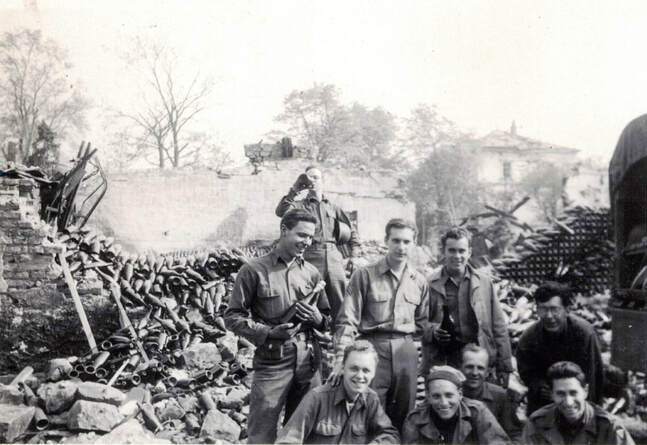France
August 28, 1944
Letters from Theodore Katz

Damage at a champagne factory; probably similar to what happened to Monsieur Martin's champagne collection. Ted is in the lower right corner of the photograph.
August 28, 1944
Dearest Helen –
Yesterday was without the shadow of a doubt the most enjoyable day I’ve spent since leaving the “land of Plenty.” It was one of those rare things that happen only once in a great while. I wish I had the time to describe it in its entirety or better still have had you with me, to see all with your own eyes.
It being Sunday and during a quiet rest period for us, restrictions were relaxed. We are bivouacked near a small town and in the morning a ceremony was held there for the liberation of France, replete with speeches and typical French emotion, along with much singing of the Marseille, parading, wining, etc.
In the afternoon the men were allowed to go swimming in a nearby lake. But Sam, Jack, I and another fellow, Sy Sandler (also a member of our group within a group) stopped off at another town where some people Sam had met the day before were awaiting us. They were a Monsieur Martin and his charming wife, his father and mother-in-law, and his own mother and father. Martin is about 32 and the parents between 60 and 70, and as with most of the people here, the most charmingly polite people I’ve ever seen – even after four years of Nazi domination. These people were warm, friendly, cultured, and full of the “joie de vivre.” Martin had been a Lt. in the French Army, his father had been the French Consul in Bolivia and his father-in-law Naval Attache in Cuba. They spoke English about as well as we spoke French, but nevertheless the conversation was all-embracing and animated. They broke out the champagne, all the while explaining and apologizing that it was not of their best stock – the Nazis having broken 800 bottles before fleeing. They proffered us cakes, pie, liqueur in delicate glassware, gold plated porcelain and solid silver service – all of which they had hidden from the Nazis. The home was beautifully furnished with typical French drapes on the windows, colorful wallpaper and priceless nick-nacks, paintings and objets d’art scattered throughout the house. They explained that the Germans had destroyed some of the paintings and showed us how these barbarians had scrawled dirty German words on the doors and walls of the house.
In spite of their luxurious surroundings they were without commodities like soap, cigarettes, sweets, coffee – so we brought these things with us for them. They were so profuse in their gratitude that it was a trifle embarrasing [sic] for us who had never felt the want for such things. I imagine that there was a certain embarrasment [sic] on their part also – they being proud people who had never before accepted such trifles, and I suppose that they felt as though it were a sort of charity. But their need for such a trifle as soap was so great, and the purposeful casualness with which we offered our presents succeeded in overcoming this difficult subject.
They showed us the family album so we in turn showed them our pictures. They were much interested in the photos of you and complimented me on my choice. At one point in the afternoon we were sitting in a combination sitting room and bedroom – very nice. The bed was built into a corner of the room in a very ingenious manner with bookshelves just above it, ashtrays, cupboards, etc. I remarked on what an interesting arrangement it was, saying that everything was within easy reach. Mrs. Martin Sr. with a twinkle in her old eye leaned forward and said, “If only your fiance were here now, eh?” This brought forth a roar of laughter from all. These French – toujour l’amour, toujour l’amour.
Later I played the piano for them and accompanied the elderly Mrs. Martin as as she sang a Madrigal. Then we all sang the French national anthem and then the American. Then Mr and Mrs. Martin Jr. danced to a Strauss waltz amid much gayety and applause. And thus the afternoon passed, all too quickly, and we finally left with “au revoirs” and “a bientot” – the end of a memorable afternoon, the war and the army forgotten for a few moments.
The truck picked us up and then dropped us at the village which had had the celebration in the morning. There we entered a little restaurant where we had by far the best meal since we’ve been in this hemisphere. Soup, omelettes, steak, french-fried potatoes, etc. – and everything was delicious. The French can really cook.
Then back to camp where I found three letters from you to round out a perfect day. I know it will be a long time before anything like this happens again, and so I have all the more reason for its appreciation.
Although this letter is beginning to assume to proportions of a novel, I haven’t told you everything – only the highlights – but when I am with you, someday and perchance happen to reread these lines – many of the details which I have omitted will be remembered and I’ll be able to tell you all, in person.
And now to you Helen. Firstly, I’m happy to hear you’re taking a vacation. That’s wonderful. I know you need one. You’ve worked very hard and really deserve the rest. Also your forthcoming new job sounds good too. What I mean is that
[last page missing]